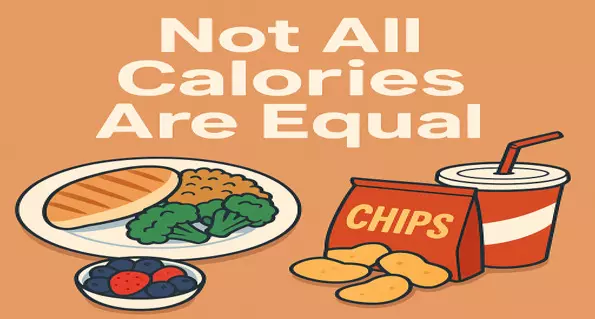Not All Calories Are Equal: Why Food Quality Matters
image for illustrative purpose

When people hear the word calories, they often think about losing or gaining weight.
It’s usually something like:
• “I need to eat fewer calories today.”
• “I walked a lot; I’ve earned this burger.”
But here’s the thing...
Not all calories are the same.
Let’s say you eat 500 calories of soda and chips.
Now compare that to 500 calories of grilled chicken, brown rice, and broccoli.
Same number of calories, right?
But your body reacts very differently to each meal.
In this post, we’ll break it down in a simple way so you can make smarter food choices.
Calories Aren’t Just Numbers
Most people think of calories as something to count.
But what really matters is what comes with those calories.
Are they bringing nutrients like vitamins, fiber, and protein?
Or are they just sugar and fat with no real benefit?
Let’s compare:
• Whole-grain bread has fiber, vitamins, and minerals.
• A frosted donut has sugar, fat, and not much else.
So, even if they have similar calories, they don’t treat your body the same.
What Are Macronutrients?
You’ve probably heard about protein, carbs, and fats.
These are called macronutrients, and they each have a job to do:
• Protein helps your muscles grow and repair.
• Carbs give you energy especially when they’re healthy carbs like oats or sweet potatoes.
• Fats (the good ones, like in avocados or nuts) help your brain and hormones.
It’s not about cutting one out. It’s about balance. Too many carbs and not enough protein? You might get tired fast and feel hungry again soon.
If you're adding a liquid supplement to your shake or meal, accurate dosing matters. Use this free mg to mL converter to get it just right.
Nutrient-Dense Foods Help You Feel Full and Healthy
Ever hear someone say “eat more nutrient-dense foods”?
That just means foods that give you more vitamins and minerals per bite.
These foods help you stay full without eating too many calories.
Great examples:
• Leafy greens
• Berries
• Lean proteins like fish or chicken
These kinds of foods help with digestion, mood, heart health and they don’t leave you feeling hungry.
So instead of eating less, focus on eating better.
Empty Calories vs. Smart Snacks
Some foods have empty calories. They taste good but offer almost nothing your body needs.
Examples:
• Soda
• Candy
• White bread
• Fried chips
They give you a sugar rush and then crash your energy.
Eat too many over time? It can affect your weight, mood, and blood sugar.
Smarter snack ideas:
• Greek yogurt with berries
• A handful of almonds
• Veggie sticks with hummus
These foods fill you up and give your body the fuel it actually needs.
How to Build a Healthy Plate
Ready to eat better without overthinking?
Start with this:
• Pick whole foods over processed ones.
• Eat colorful fruits and veggies.
• Choose lean proteins and healthy fats.
• Swap white bread for whole grains.
Some easy tips:
• Meal prep when you can.
• Keep healthy staples like frozen spinach or brown rice on hand.
• Aim for a colorful plate, it usually means a more balanced meal.
Want to control portions?
Try smaller plates or serve food in the kitchen instead of at the table.
It’s about being aware, not being perfect.
Rethink Calories for Better Health
Here’s the big idea:
Don’t just ask “how many calories?”
Also ask “what kind of calories?”
When you focus on quality over quantity:
• You feel better
• You eat more mindfully
• You don’t have to feel guilty about food
Food is more than just fuel, it’s comfort, culture, and joy.
Your goal isn’t to eat perfectly.
It’s to eat with purpose.
Helpful Tools to Guide You
Want to make smarter food choices? These tools can help:
• Check out Harvard’s Healthy Eating Plate, A simple guide for balanced meals.
• Use free apps like Cronometer to track your nutrients.
Final Thought
You don’t need to count every calorie to be healthy. But learning the difference between good calories and empty ones? That can change everything; how you feel, how you eat, and how you live tomorrow.

